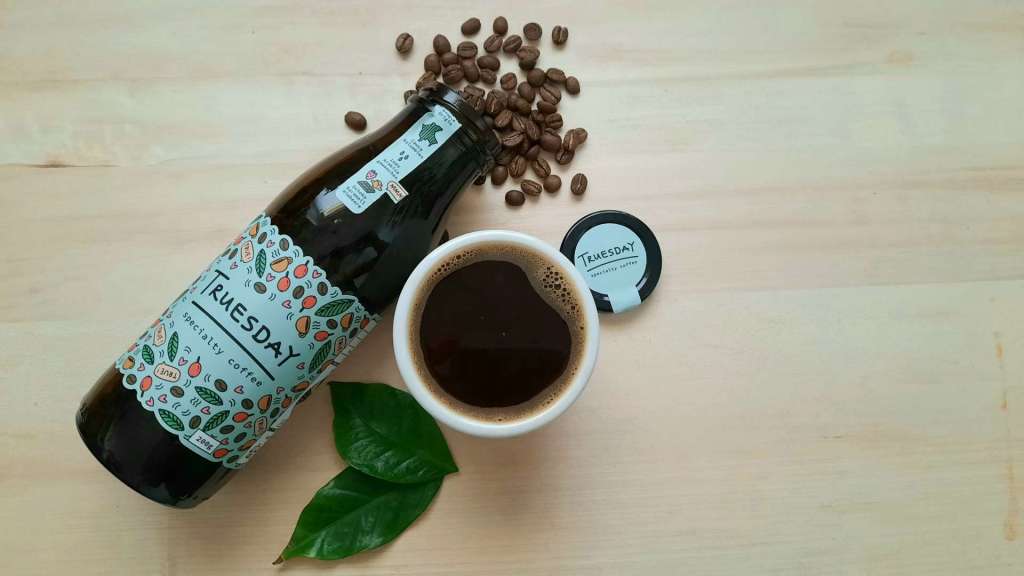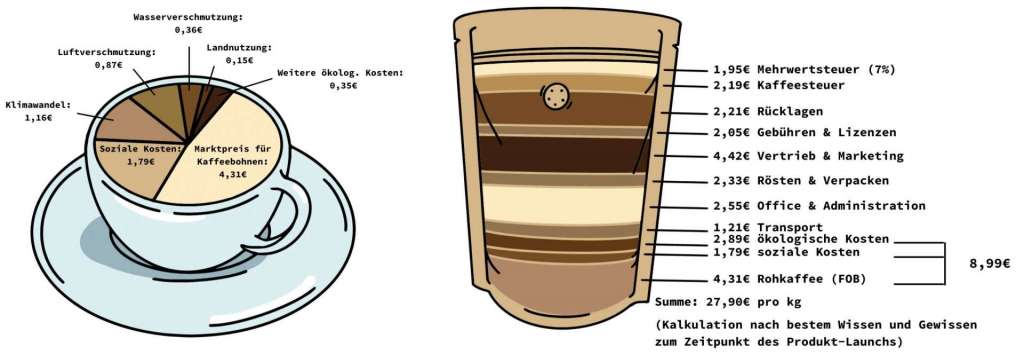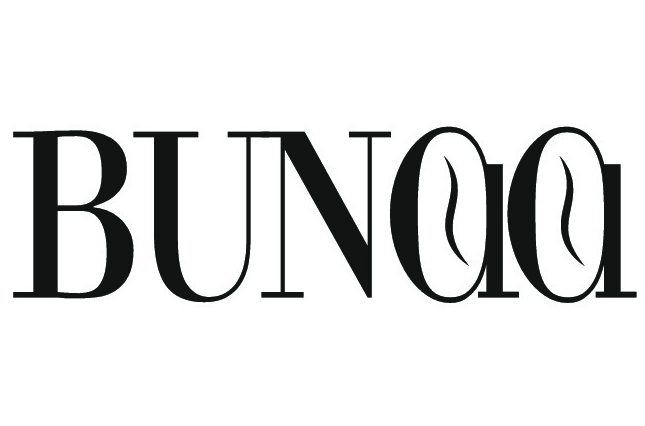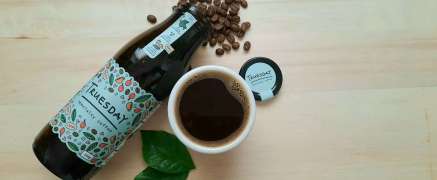Cooperation
What can one expect from the second most valuable good in the world in terms of transparency? Coffee has been shipped for centuries from all countries around the world and more than 25 million people work in the coffee industry worldwide. At the same time they provide the basis of livelihood for approx. 100 million people.
Obviously, a lot of people make money from your caffeine kick. And to start with the sad news, the coffee farmer gets a price that is far too low for most of the work on the end product, even with fair trade coffee. Unfortunately, it is often unclear which route the coffee takes and who receives how much money. The traders and exporters often disguise the prices and earn decent profits. I will compare the price calculation of industrial coffee and Fairtrade coffee for you in advance, before there is a really exciting and Germany-wide unique interview with Henning Reiche, the founder and managing director of TRUESDAY. He has a unique approach not only to fairly reward farmers, but also to produce a really sustainable, delicious coffee.
Some facts about the coffee business
- 1 coffee tree produces between 500 g – 1 kg of roasted coffee per year.
- 92% of the world harvest is conventional coffee that is grown in monocultures, is harvested by machines and thus damages the soil and biodiversity.
- For sustainably grown coffee (8% of the world’s coffee), only the ripe coffee cherries are picked by hand.
- The green coffee price is subject to strong fluctuations and, for conventional coffee, is based on the stock price.
- Examples of typical cost factors for coffee: wages coffee farmers & harvest workers, coffee processing, packaging and storage rental in the country of origin, transporters, preparation of export documents and fees, sea freight, transport insurance, loss of raw materials during sea transport, costs of monetary transactions / exchange rate losses, import costs, possibly another cleaning of the coffee in the port of destination, storage in the consumer country, roaster, roast loss, packaging, marketing / sales and much more …
- In addition, there is a coffee tax of 2.19€ + 7% VAT on every kilogram of roasted coffee in Germany.
- With conventional coffee, the coffee farmers only receive a 5% share of the coffee price. With a typical price per 1 kg of 8.10€, that’s 0.40€.
- In the case of Fair Trade certified coffee, it can be 26% of the price that remains with the coffee farmers in the cooperative. However, the farmers also have to pay for the certification! For example, calculated on the kilo of coffee, this is 5.40€.
- With the new Truesday specialty coffee, 8.99€ per kilo of coffee remains in the coffee-growing region!

Interview with Henning, the founder of Truesday Coffee:
How did you come up with the idea of selling a coffee that pays farmers a really fair price?
Henning: In a barista workshop I learned how the price of coffee is made up and I was shocked at how little farmers get for their work. After doing some research, I found out that the majority of small farmers work below production costs. So some farmers can not receive medical care as an example.
Now there are already various concepts such as Fairtrade certification or donations per bag of coffee for projects in the coffee-growing area. In your opinion, is the price that remains with the farmers still too low?
Henning: Definitely with conventional coffee! Anyone who sells coffee in the supermarket for 7-8€ per kilo will not be able to pay farmers fairly. Roasters with specialty coffees already pay farmers a much higher surcharge. But there is also ecological damage to coffee production, such as climate change, air pollution or water pollution. To ensure that coffee growing is good for nature and people more than it harms them, we need the True Price. For me, a really transparent price means first of all knowing the price that coffee farmers actually get.
Aren’t there some roasters who publish a transparent?
Henning: The FOB price is often published here, but not the price that farmers actually received. From our own experience, it is very difficult to determine this price and in some countries it is almost impossible.
What exactly does FOB price mean and what is the difference to Farmer price?
Henning: The FOB price stands for “Free On Board” and means that the exporter delivers the coffee at his own expense and with his own insurance up to the transport ship. Once the ship has been loaded, the importer assumes all costs, obligations and risks for the transport to the destination. So the FOB price is the port price. Exporters are usually reluctant to reveal how much farmers get from it.
I’ve heard that in Mexico, farmers have to sell their coffee to a middleman, called Coyotes. The farmers have to sell their coffee to any price because they have no alternative. That sounds terrifying. Does that also exist in Colombia?
Henning: Yes, I’ve also heard various stories that sound like Narcos. A truck with green coffee worth several thousand euros is often secured by motorcycles with men with pump guns and bribes are paid at one or the other bridge to bring the beans to the port. We won’t be able to fight corruption across the country, but we can certainly do more to ensure that the coffee farmers, who do a lot of the work, are better paid.
And how did you manage to determine the farmer’s price?
Henning: It wasn’t that easy at all. First, a European trader wanted to put us in direct contact with a farmer whose coffee we had tried. Unfortunately it did not work out. After a few months we finally managed to get in touch with the Colombian farmer ourselves via Facebook and asked him what price he had received for his specialty coffee. Then we calculated what price the farmer should actually receive.
Can you tell more about the price calculation – your true price?
Henning: Sure. We not only take into account the value of the coffee beans, but also 100% of the ecological and social costs involved in growing coffee. In cooperation with international NGOs and social enterprises, we bring hidden costs to the surface, such as underpaying farmers, soil pollution and water pollution in order to reduce and compensate for them. It looks like this:

That sounds like a lot of work if you’ve done this for a single coffee farm. How does this affect the farmers?
Henning: You have to be very sensitive to the subject. We cannot buy coffee from the entire region. Most farmers still have to surrender their harvest at a price that is dictated to them far too low. If the farmers start demanding more money now, that could get them into trouble or the exporter won’t buy any more coffee from them in the future. That would not help anyone. Envy among farmers could also become problematic if a farmer receives significantly more money for his coffee.
That sounds like a real tightrope walk. One can only hope that there are more companies who follow your way of pricing and more consumers who value real transparency and who spend more money on good coffee. Is there anything else for the future that you would like to do differently or better?
Henning: We have to become more scalable. Our individual calculation of the price on the basis of a farm is more like a social enterprise than a concept that the majority of farmers worldwide can join in order to have a noticeable effect on our environment and improve the living conditions of the farmers. We need a new, more sustainable economic model.
I keep my fingers crossed for your project! First of all, thank you for these new insights and the really delicious coffee from your Colombian farmers Ciro Camayo and Elver Tulade. I was not only allowed to try it in advance, but was even present when it was roasted in Berlin Charlottenburg. The coffee is roasted in a modern way, beautifully full-bodied, chocolaty and still with a subtle fruity note. YUMMI!


